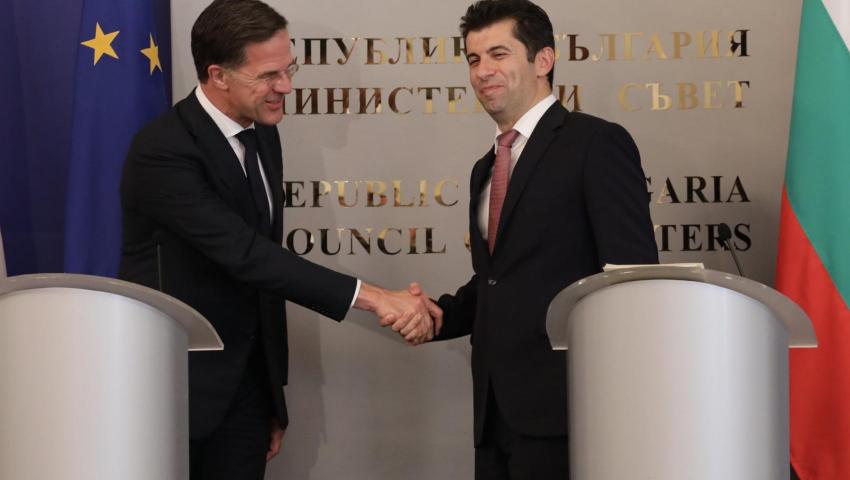The government is reviving the idea of building an oil pipeline between Bulgaria and Greece

Source: BTA
Within 2 years, Bulgaria can diversify its oil supplies through an oil pipeline to be built jointly with Greece. This was announced by Prime Minister Kiril Petkov after a conversation with the Prime Minister of the Netherlands Mark Rutte, who praised the firm position of our government on the suspension of Russian gas to our country.
The Bulgarian Prime Minister is adamant that our country wants to be part of the exceptions to the European embargo on Russian oil, as this dependence is 95% for us, and we have already refused to pay for Russian gas in full and finance Putin's regime but it takes time - two years to build an oil pipeline:
"We are currently talking about the possibility of acquiring shares in Greek ports. I believe that very quickly, together with Greece, we must invest in the possibility - north-south to put the infrastructure that will give us such an opportunity. We see at the moment that two years would be a good period, if we work very intensively, not to be in this dependence that we have at the moment, "said the Bulgarian Prime Minister.
We recall that ten years ago the idea was developed to supply Russian oil to the Mediterranean, bypassing the Bosphorus and the Dardanelles. The project aimed to build a new oil pipeline between Bourgas and the Greek city of Alexandroupolis. If such a project was completed, our country would now be able to import significant quantities of crude oil from the Mediterranean basin.
"What Poland and Bulgaria have done is not just a struggle between countries and Russia, but a struggle between Russia and Europe," said Mark Rutte, commenting on the situation with the suspended gas supplies from Sofia:
"This is not between Russia, Bulgaria and Poland - on the contrary, this is between the European Union and Moscow through you. That is why I want to congratulate you - at an important moment you showed Moscow that we can be together."
The Netherlands is the portal of Europe from the west, and Bulgaria can be the portal of Europe from the east. Petkov and Rutte discussed in private the possibilities for deepening bilateral relations between Bulgaria and the Netherlands, as well as current issues on the European agenda, including in the context of the war in Ukraine.
After the meeting, the Bulgarian Prime Minister pointed out that joint projects in the field of agriculture and the IT sector were discussed. The two countries will also work to establish a common fund for investment in new technologies in agriculture, which could be operational by September. "We have set ourselves the task of turning these good plans into real steps in the next few months," Petkov said.
As for when our country will be admitted to the Schengen area - an obstacle for the Netherlands, Petkov said that we must deal with corruption. "We have a vision for a Europe with zero corruption. I confirmed that this is a very important focus of the Bulgarian government, both at the Bulgarian level and at the European level. We also discussed the fact that Russian energy projects and Russian foreign policy often involve corruption. "Together, as member states, we must be sure that this type of influence in the EU is absolutely unacceptable," added Kiril Petkov.
The Bulgarian Prime Minister announced that he and Rutte also talked about the accession of our country to the Schengen area. According to Kiril Petkov, fulfilling the strongest task of the Bulgarian government - to eliminate corruption and increase the level of Bulgarian institutions - is the safest way to Schengen. "Mark assured me that this is the way. It is not a matter of political statements, but to do our job," said the Bulgarian Prime Minister.
The two prime ministers also expressed a desire to work on a number of joint initiatives and projects related to agriculture, the IT sector, artificial intelligence and the green economy.
The meeting between the Prime Ministers of Bulgaria and the Netherlands was followed by a plenary session of the two delegations.
